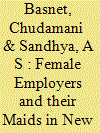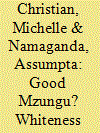| Srl | Item |
| 1 |
ID:
172211


|
|
|
|
|
| Summary/Abstract |
The domestic labour market in India reflects how various classes of women manage their daily lives, whether as employers of domestic workers or as employees. The cultural underpinnings of various intersecting relationships implicated in this scenario have remained underresearched in India. Based on a qualitative study in a specific neighbourhood of New Delhi, this article shows that certain cultural strategies pursued by female employers explain their differential behaviour towards specific groups of maids. Observing that these female employers in Delhi prefer Nepali maids over native Indians, even if the latter are willing to work for lower wages, we set out to analyse why and how these employers evaluate immigrant Nepali maids as sharing ‘our’ culture, while native Indians are classified as the cultural ‘other’.
|
|
|
|
|
|
|
|
|
|
|
|
|
|
|
|
| 2 |
ID:
189409


|
|
|
|
|
| Summary/Abstract |
Scholars looking at whiteness through a postcolonial lens have notably explored the lingering and multi-faceted nature of whiteness in the wake of empire. We apply Shome’s argument that whiteness is rendered visible through how it is ‘disembodied’ to explore how whiteness is signified and interpreted in a postcolonial Ugandan context and with the term Mzungu. Disembodied whiteness centres the discursive and material forms of whiteness. Interview and focus group data from domestic workers who work for foreigners in Uganda are analysed. We argue in Uganda whiteness is structurally present in the growth of the development aid state and discursively understood in contrast and relation to Africanness and Blackness. Whiteness, Mzungu, African, Black represents multiple understandings and a duality for the Ugandan domestic workers who work in the foreign households of the aid state. Ultimately, postcolonial whiteness in Uganda sustains white supremacy, but fissures, contestation, and disruption also follow its production.
|
|
|
|
|
|
|
|
|
|
|
|
|
|
|
|
| 3 |
ID:
163832


|
|
|
|
|
| Summary/Abstract |
Labour protection has become a dominant agenda in global migration governance, particularly for sending countries whose diasporic citizens are denied political rights in host states. Despite having limited authority to arbitrate extraterritorial disputes, sending countries like Indonesia have deployed novel techniques of statecraft to improve migrant protection. Through the prism of the professional competence exam and pre-departure orientation seminar, this article investigates the Indonesian state’s regulatory practices that focus on migrant conduct. Although outbound domestic workers are subject to a prolonged process of skill formation, other Indonesian contract workers pursue emigration upon acquiring basic legal knowledge without undergoing accreditation. While both programs are designed to inculcate migrant capabilities for self-protection, the state’s professionalization of domestic workers constitutes a liberal strategy of exclusion that is predicated on their master status as “vulnerable victims” in public discourse. To understand Indonesia’s increasingly mediated migration infrastructure, then, requires attention to the liberal rationality of protection that involves the transformation of migrants into self-regulating subjects.
|
|
|
|
|
|
|
|
|
|
|
|
|
|
|
|